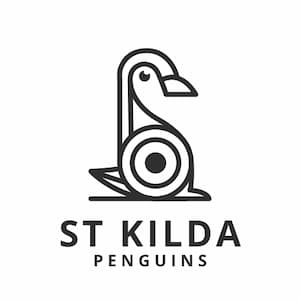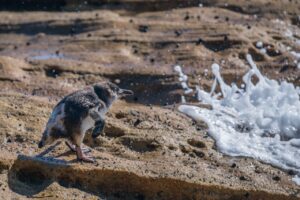Conservation and Research Strategy Earthcare St Kilda
Introduction 1.0
Research 2.0
Penguins 2.1
Rakali 2.2
Water 2.3
Other research2.4
Other Activities 3.0
Vegetation works3.1
Education 4.0
Visitors 4.1
School groups 4.2
Tertiary students 4.3
Media 4.4
Volunteers 5.0
Training 5.1
1.0 Introduction:
Earthcare St Kilda was established in 1989 with the primary purpose of caring for the local environment, following the motto “Wedo what we can, where we are”. Today Earthcare is involved in a number of community based projects that rely on volunteers to achieve practical environmental conservation and research. The activities of Earthcare are broad in scope, including, but not limited to; penguin research, rakali research, revegetation, weeding, litter removal, lobbying for sustainable development and education. Earthcare membership is open to anyone, and visitors to activities are welcomed.
Earthcare volunteers come from a variety of backgrounds and bring with them numerous skills and breadth of knowledge. The activities and achievements of Earthcare are a direct result of the dedication and determination of volunteers. Individuals within Earthcare are encouraged to share their knowledge and skills with others to achieve outcomes consistent with Earthcares’ principals and objectives.
1.1 Key objectives of Earthcare:
- Conduct research into local wildlife that aids in its management and conservation
- Conserve the local environment and habitats
- Provide education on the local environment to the general public, students, councils, management authorities and other relevant parties
2.0 Research
General
Key areas of research:
- Penguins
- Rakali
- Water (fresh and marine)
- Other
e.g. Sea grass, fish, birds
2.1 Penguin research
Objectives
-
- Monitor St Kilda penguin population
- Facilitate management of St Kilda penguins
- Educate public (local community/wider community?)
- Treatment for injured penguins
- Research into penguin biology for the sake of penguin management and bay ecosystem management
- Present and share research with other individuals/organisations/ institutes
- Maintain and enhance habitat for penguins
Main contact people
Zoe Hogg [email protected]
Tiana Preston [email protected]
2.2 Rakali research
Objectives
- Monitor and record populations of rakali within CoPP
- Research
- Educate public (local community/wider community?)
- Present and share research with other individuals/organisations/ institutes
Main contact people
Bob Tammik [email protected]
Alyson Svenson
2.3 Water research
Objectives. To keep a watch on water quality in waterways. lakes and Port Phillip Bay within the City of Port Phillip
Main contact people
Paul Rees (Fresh Water) [email protected]
Zoe Hogg (Salt Water) [email protected]
2.4 Other research
Objectives
To keep a record of the biodiversity in the City of Port Phillip
Main contact people
Andrew McCutcheon [email protected]
3.0 Other Activities
Nature Watch
Andrew McCutcheon [email protected]
3.1 Vegetation works
Planting, weeding and upkeep of Natural Heritage areas, including the West Beach Salt Marsh, Balaclava Rail and St Kilda Breakwater.
4.0 Education
4.1 Visitors
Local
Groups (including schools)
Japanese sister city of Obu.
4.2 Presentations by Earthcare
Members from Earthcare regularly make presentations to local schools and community groups on topics including penguins, rakali and conservation. We appreciate clear instructions on where/when/how long/what audience presentations are requested for. Earthcare does not charge for these presentations, however as these presentations are made by volunteers it is advised that presentations should be organised well in advance of the intended date (at least one month) and presentation facilities (ie projector for PowerPoint presentation) should be available. Donations towards Earthcare activities are appreciated, but not necessary.
Earthcare organises a number of free presentations at the EcoCentre in St Kilda every year.
4.3 Tertiary students
Students wishing to work with Earthcare on research projects are encouraged, however this needs to be carefully co-ordinated to ensure that
- a) work conducted by the student is consistent with Earthcare objectives
- b) work conducted by the student is not duplicating work already conducted
- c) work is conducted under relevant permits and approvals – it is the students responsibility to organise these
- d) student works in conjunction with others working in that particular area and acknowledges support of Earthcare.
Student enquiries should be directed to the main contact people listed under each research area. Students should note that although Earthcare encourages student research activities, it’s members are volunteers with limited time for each project, and it is not the responsibility of Earthcare to supervise student activities.
4.2 Media
Should meet Earthcare research objectives
5.0 Volunteers
Must be members of Earthcare St Kilda
5.1 Training
Penguins
Level 1:
General penguin handling including: catching penguins, weighing, sexing.
Level 2:
General penguin handling plus inserting microchips and removing flipper bands. Micro-chipping must be taught by a vet, Phillip Island Nature Park, or level 3 person.
Level 3:
General penguin handling, micro-chipping, removing or tightening flipper bands plus more invasive techniques including blood sampling, stomach flushing, attaching/removing loggers, collecting swabs etc. Training by experienced level 3 person, and only conducted under special permits.

